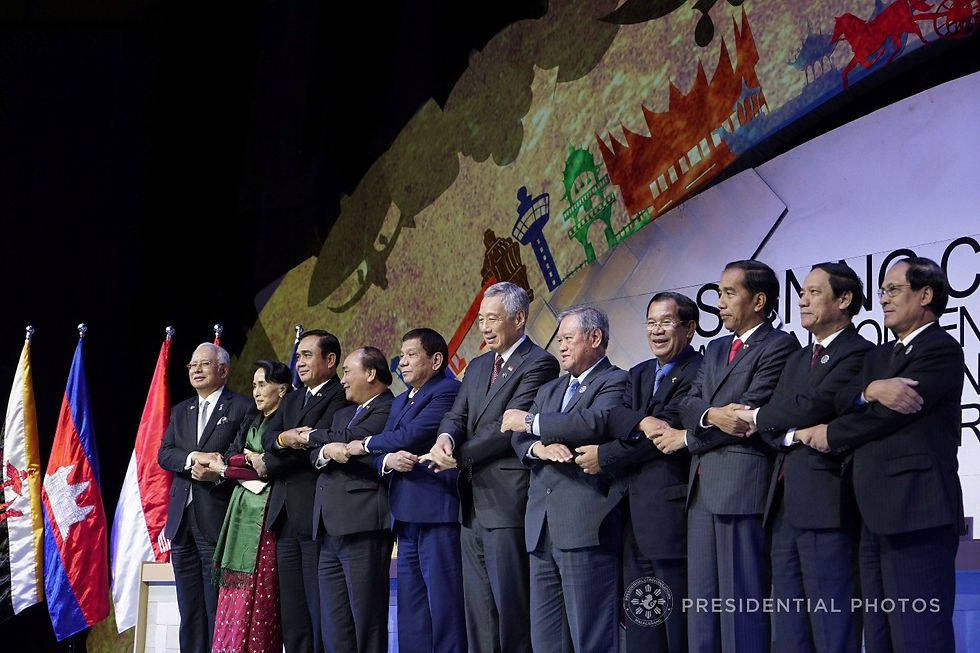Fanfare, formality and Duterte's rants at ASEAN Summit
- By Diana Mendoza
- Dec 1, 2017
- 3 min read

Manila — As the pomp died down on the Philippines' hosting of the 31st Association of Southeast Asian Nations (ASEAN) Summit and Related Meetings in early November, the spotlight remained focused on President Rodrigo Duterte as he cozied up to China, the region's aggressor in territorial waters, and fumed at the mention of human rights under his government.
In a move seen by his puzzled critics as perilous, Duterte did not make the most of his chairmanship of the 10-member regional bloc by opting to cooperate and not raise the issue of the South China Sea disputes among the regional bloc's member states with China's incursions in the territorial waters despite a ruling by the Permanent Court of Arbitration favoring the Philippines in the South China Sea conflict.
He also shot back at Canadian Prime Minister Justin Trudeau who raised the issue of "human rights, the rule of law, specifically the extrajudicial killings being an issue Canada is concerned with" in a press conference before he travelled back to Canada.
In his press conference that concluded the summit, Duterte was back in his usual brashness. "It is a personal and official insult," he said of Trudeau's remarks. "I said I will not explain. I was elected by the people of the Republic of the Philippines. I only answer to the people of the Republic of the Philippines," he said. He added, "I will answer to the Filipino. I will not answer to any other bullshit, especially from foreigners."
New Zealand Prime Minister Jacinta Andern added to Trudeau's comments, although she was spared from Duterte's ire when she brought the issue of values and peace during their bilateral and her country's concern that "the number of deaths certainly requires investigation and oversight at the very least."
Duterte's hardline stance on illegal drugs is known globally as activists have counted more than 12,000 extrajudicial killings of mostly poor Filipinos suspected of drug use and peddling. The populist Duterte has been questioned by international human rights groups for his drug war policy and continues to attract attention, especially when he admitted in a speech in Vietnam on the sidelines of the international summit that he has killed someone at the age of 16.
Clad in formal Filipino Barong Tagalog, leaders of the 10-member ASEAN composed of Brunei Darussalam, Cambodia, Indonesia, Laos, Malaysia, Myanmar, Thailand, Singapore, Vietnam and the Philippines, concluded their summit with agreements to forge a code of conduct in the South China Sea to ease tensions over disputed water territories, broaden economic opportunities, protect migrant labor, prevent cybercrime and fight terrorism. Some state leaders raised their concerns over the plight of Rohingya refugees of Myanmar.
Besides being friendly to Chinese Premier Li Keqiang, Duterte also cozied up to US President Donald Trump, who stated that he has a "great relationship" with Duterte and did not mention human rights under his bloody war on drugs. Duterte even sand his favorite song "Ikaw (You)" to Trump upon his request, although journalists said Trump "ordered" him to sing.
Besides Trump, Trudeau, Keqiang and Adern, the other ASEAN dialogue partners present were United Nations Secretary General Antonio Guterres, Prime Minister Dmitry Medvedev of Russia, Prime Minister Shinzo Abe of Japan, Prime Minister Malcolm Turnbull of Australia, President Moon Jae-in of South Korea, Prime Minister Narendra Modi of India, European Council President Donald Tusk and Prime Minister Rui Maria de Araújo of Timor Leste.
The ASEAN heads of state were Thailand Prime Minister Prayuth Chan-ocha, Vietnam Prime Minister Nguyễn Xuân Phúc, Laos Prime Minister Thongloun Sisoulith, Brunei Sultan Hassanal Bolkiah, Cambodia Prime Minister Hun Sen, Malaysia Prime Minister Najib Razak.Myanmar state counselor Aung San Suu Kyi, Indonesia President Joko Widodo, and Prime Minister Lee Hsien Loong of Singapore, who will hold the chairmanship next year.
Amid giant Christmas lanterns and performances by Filipino talents, the Philippines' hosting also coincided with the 50th anniversary of ASEAN, the regional body that is now one of the most open economic regions and the seventh largest in the world, and in Asia, it is the third largest.


